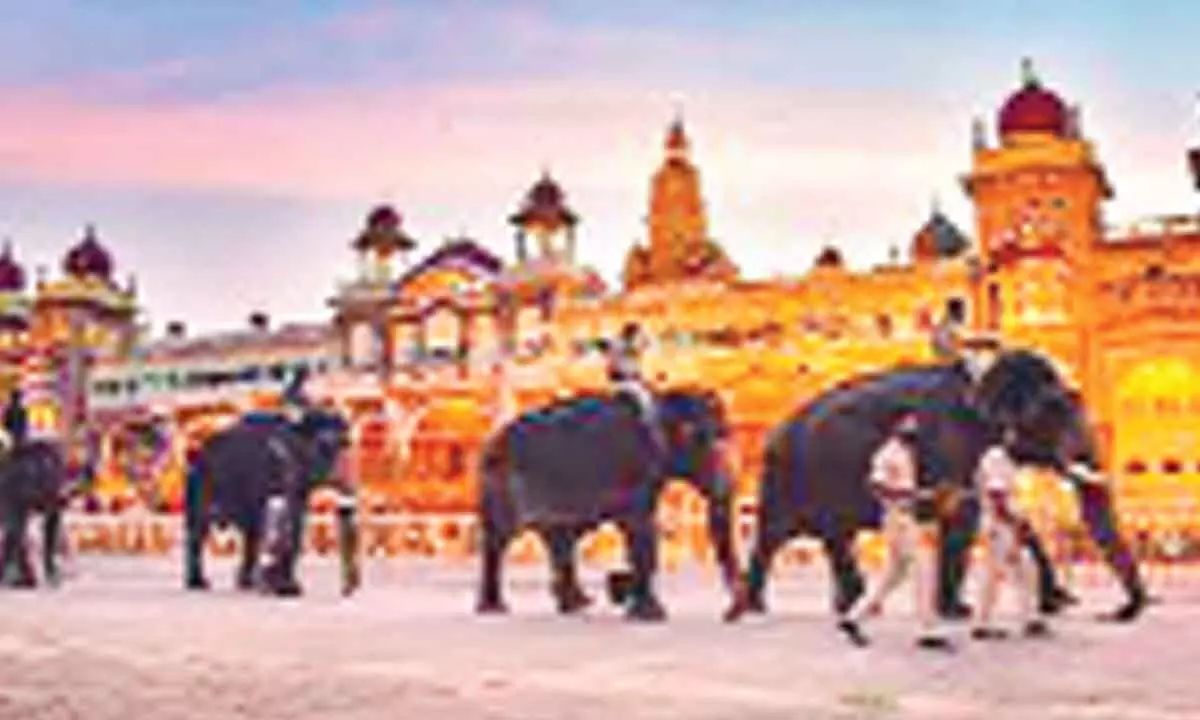Animal rights activists opposed to the use of animals

Animal welfare activists have trained their guns towards the cruelty shown towards the elephants that take part in the fabled Dasara of Mysore.
Mangaluru: Animal welfare activists have trained their guns towards the cruelty shown towards the elephants that take part in the fabled Dasara of Mysore. The load is nearly a tonne on the elephant that carries the Golden Howdah and it is made to walk on the flat tarmac for 9.4 kilometres from Amba Vilas Palace in central Mysuru to Bannimantap during the Jamboo Savari. The Howdah itself will weigh 750 kg, while the weight of Gaddige, Mahout, and the caparison will add another 250-300 kg. "The journey takes nothing less than 2 hours. Is that not cruelty to animals?" asked Rajiv Shetty, a Kambala organiser. "If the Animal Welfare Board thinks Kambala was cruelty against animals than even the Dasara Jamboo Savari amounts to animal cruelty," he added. Even on Saturday, at the palace grounds in Mysuru, a few elephants panicked when a mounted police horse showed unruly behaviour. This has been happening every now and then, but the government is hell bent on using animals in heavily crowded places during the Dasara, which stresses the animals, especially the elephants.
Gunapal Kadamba, an authority on Kambala and promoter of the Kambala Academy at Karkala, said, " Why leave out horse racing? If those horses were being whipped by the jockeys continuously if the Animal Welfare Board was turning a blind eye to the cruelty towards horses in Bengaluru Turf Club and Mysuru Turf Club, is it just because it was a rich man's sport? Why force the poor elephant to walk with a tonne of weight on its back just because the Mysuru Dasara has a royal halo and religious overtones? The Kambala was stopped just because it was a folk sport played by rural rustics. I remember the statement that all are equal in the eyes of the law but some are more equal, "Kadamba said.
Senior forest officials were also wary of such a situation. They said, on condition of anonymity, that the complexities of conditions prevailing in the present day Dasara put animals under great stress, especially the elephants that were very sensitive mentally. There should be reforms to make the burden of both the howdah-carrying elephant and its mahout lighter. But the forest officials were mortally afraid of the political masters and would not tell them the truth.
The animal rights activists of Dakshina Kannada, quoting the elephant report given by the Karnataka Elephant Task Force in 2012, said that "Captive elephants should be used only by the department for purposes such as patrolling forests, tourist rides, biological research, elephant-human conflict management or exchanged with other state forest departments for similar use." Newly captured elephants should not be given to temples, circuses, or other commercial use. KETF says that the Dasara festival in Mysore, where elephants are shown off, is a great example of Karnataka's rich cultural history that should be kept alive.
"Nevertheless, as a demonstration of the state's commitment to addressing issues in the conservation of its wild elephants as well as the welfare of its captive elephants, we suggest that the heavy 750 kg golden howdah carried by the lead elephant in the Mysore Dasara procession be replaced with a much lighter replica or carried in a chariot drawn by the elephant. Such a symbolic gesture, especially as something that crowns a series of measures to further elephant-human coexistence in Karnataka, could make the state a national and international leader in elephant conservation and bring down cruelty to animals. Especially when the elephant was a Schedule I animal in the 1972 wildlife act," Rathnakar Shetty, an animal welfare activist explained.
The Dasara elephants come directly into the urban areas of Mysuru and participate in the training for the Dasara Jamboo Savari. They are made to stand in front of the 21 guns and bear the sounds of the shots fired for almost 10 days every day. "I have seen them panicking with every shot that is fired. After they remain in the woods at various elephant camps, when they hear only the sounds of the forests—their natural habitats, suddenly they are being forced to take part in such noisy conditions of human civilization which can confuse them," a retired forest official (wildlife) told The Hans India.

